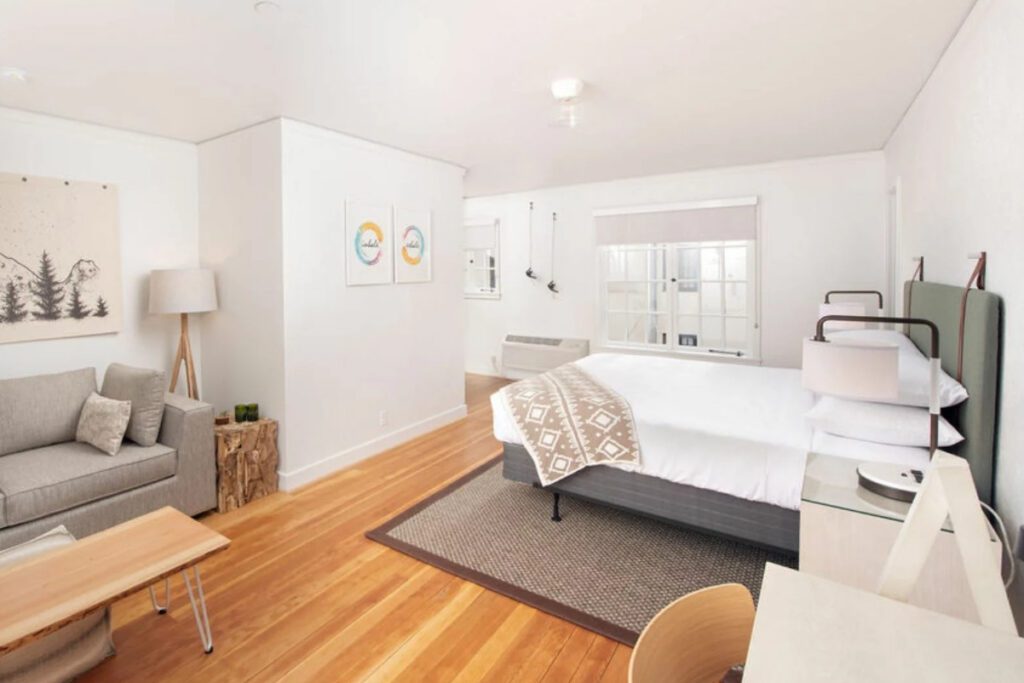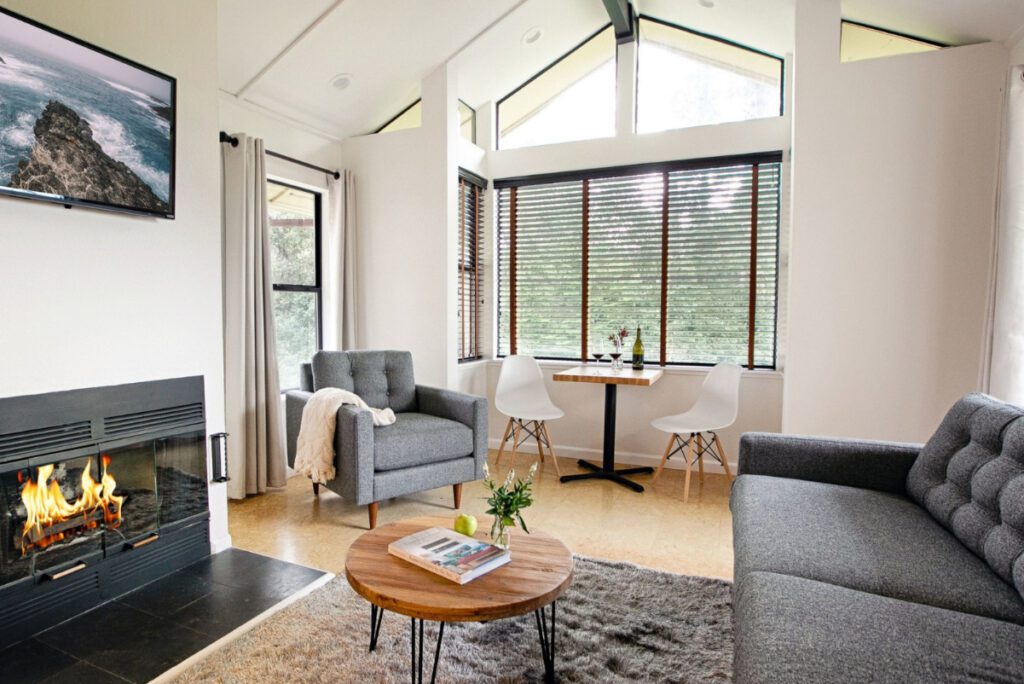[ad_1]
Skift Take
We like how this new hotel brand is testing rare concepts. It suggests a rate but lets guests haggle if they feel underwhelmed. It ties guest stays to specific, if minor, environmental and community fixes. And it opposes the trendy asset-light model.
U.S.-based hospitality company Soul Community Planet has been growing its SCP Hotels brand at a modest clip, having reached 10 properties in only five years.
- Earlier this month, it said it had acquired the 22-room Albion River Inn, a luxury boutique hotel in Albion, California. The property, to be renamed the SCPMendocino Coast Lodge, marks the brand’s fourth coastal California property. It’s close to the SCPMendocino Inn & Farm, which SCP acquired in June 2022.
- It plans to grow its portfolio to 25 hotels by 2025.
- In December, it went abroad for the first time, acquiring SCP Corcovado Wilderness Lodge in Costa Rica.
- It won a Skift Idea Award in 2021 for its “Every Stay Does Good” program, which ties each guest visit to an impact on select charities.
Ken Cruse is the co-founder and CEO of SCP Hotels. I spoke with him to get a sense of the company’s strategy.
- Cruse spent many years as chief financial officer and then CEO of Sunstone Hotels, the public real estate investment trust.
- In 2018, after having left Sunstone, Cruse, along with his wife Pamela Cruse, had an idea.
- “Among a segment of consumers, the idea of conscious consumerism has really taken root, yet some large legacy hotel companies had been a little bit slower to adapt to that,” Cruse said. “We saw an untapped niche here in our industry to come in and go much deeper on values-based hospitality.”
- His small private equity firm, Alpha Wave, fronted roughly $1 million to acquire hotels.
- By the end of 2019, SCP Hotels had three hotels and raised approximately $2.3 million of venture equity fundraising from friends and family.
At the end of 2020, SCP Hotels received a $210 million investment.
- This backing came from an unnamed, North-America-based private equity shop whose portfolio includes investing in aircraft leasing and non-performing loans.
- It owns five hotels through the affiliate run by this private equity firm. The rest it owns through affiliates it controls, such as Alpha Wave. It manages all of its properties.
- “Our deployment of that $210 million has been slower than any of us would have wanted,” Cruse said. “There’s been a feeding frenzy on hotels. Over the last few years, we’ve underwritten deals to X level, and then everybody has shown up and paid anywhere from 20 percent, 40 percent, or 2x times more than what we’re willing to pay. Yet I feel like our underwriting was right.”
- “Organizationally, we’re at about 27 percent leverage against our market value today, mostly based on appraised values, which is better than a lot of REITs [real estate investment trusts],” Cruse said. “I feel really good about having that relatively low level of leverage going into what’s likely to be in a mid-term cyclical recession. Having good liquidity and positive cash flow is a good place for us to be in.”

One of SCP Hotels’ innovations is a name-your-own-price concept.
- It calls this policy “fair trade pricing.” It suggests a rate but lets guests haggle downward at checkout if disappointed in the hotel stay.
- So far, only about 0.5 percent of revenues have ended up in downward price revisions, Cruse said.
- Not that they’re asking me, but I think that’s too low. If 99 percent of customers are happy with the price, SCP is probably not charging enough per night, on average. But what do I know?
SCP Hotels also tries to make good on a promise for responsible travel, or regenerative tourism.
- Cruse said his company couldn’t solve the climate crisis on its own, and he acknowledged that the act of traveling and visiting a destination would emit carbon. But he said raising awareness of environmental issues is a step in the right direction — and something sought out by an increasing group of conscious consumers.
- SCP Hotels is moving toward having fully vegetarian food offerings.
- In Costa Rica, next to its new SCP Corcovado Wilderness Lodge, it supported a month-long clean-up of beaches at the neighboring Corcovado National Park. Last month SCP signed a deal with Innoceana, a non-profit marine conservation group, to create a research facility at the lodge and help run five-day, scientist-led conservation adventures.


I’ve written before how, in a world where so many hotel companies want to be asset-light, there may be more of a competitive opportunity to be asset heavy. (See my interview with a leading researcher on asset-light versus asset-heavy.) Cruse agrees.
- “Our plan as we scale would always be to control the real estate and be the management company and run the brand,” Cruse said.
- “At SCP Hotels, we believe that the success of the real estate is 100 percent predicated on how effective the team is in operating those hotels, which is why we want to control the entire ecosystem.”
- “I don’t see us ever franchising,” Cruse said. “Why would we outsource something as critical as the guest interactions?”
- “Through the franchising model, you’re relegated to creating a product that’s adoptable by the lowest common denominator of the developer community or third-party management community, which, by definition, are much more diluted experiences and the opposite of where the opportunity lies,” Cruse said.
- “There are a lot of things about the hotel industry that are mind-boggling, but one is the fact that real estate owners engage with third parties to put a flag on a hotel and pay them — if you really add up all the fees and associated costs — 15 percent of revenues,” Cruse said. “Then you hire a third-party management firm to run your hotel, and you give them typically 3 percent of the top line and hope they do a good job. And as the real estate owner, you just take what’s left over, which often isn’t enough.”


One advantage it feels it has against the large hotel groups is that those groups are too large to find it worthwhile to buy up lodgings that only have about 12 to 30 rooms.
Cruse said many owners of these smaller properties are struggling, and he expects distressed opportunities to emerge. He gave an example:
- “We were recently looking at a beautiful hotel that would fit nicely in our portfolio,” he said. “It’s kicked out, let’s call it, $17 million of revenue a year, between 2015 and 2019.”
- “The manager over those five years before the pandemic made about $2.5 million in fees and passed all of their costs down,” Cruse said.
- “The owner made literally zero out of that hotel,” he said. “It’s not even branded, which would have led to additional fees.”
- “This is why I want to be fully integrated with the brand, the management company, and the real estate under one roof,” Cruse said. “It’s the only model that can let us innovate profitably.”
SCP Hotels look to buy low and sell high, helping relieve owners of properties they can’t figure out how to make profitable with attractive offers and then applying its management savvy, conscious consumer operational approach, and branding work to drive squeeze out more returns from the asset.
- “We closed this month on a 22-room property in the Northern California coast that’s had a very productive restaurant that’s done well over $1 million year perennially,” Cruse said.
- “It was family owned and operated, but the second generation is going off to do their own things and never developed modern operating practices,” he said. “They still had rack rates printed, for example, rather than using software to vary rates as supply and demand shifts.”
- “We got the deal at a price roughly 30 percent below what they originally were asking, and it was about educating them about what the value of the property truly was and being able to get attractive financing on our end in a very difficult credit market right now,” he said.
SCP’s dealmaking will only work if it can cost-effectively add other equivalent properties in the region and operationally leverage its housekeeping staff, managers, and other employees and its brand campaigns across the networks. That sounds great in theory but may be tricky in practice as the network grows and risks becoming more unwieldy.
- “We had already acquired a 31-key property right up the road,” Cruse said, following up with a larger contextual point about his strategy.
- Larger institutionally-backed players only look at properties in the 100-key-level and up in this coastal region, with Montage having bought in Healdsburg and Four Seasons having bought in Calistoga recently, in deals that were north of $2 million-per-key trades,” Cruse said.
- “What I love is we’re paying 10 percent of what those larger, luxury assets are trading for and assembling the same cumulative number of keys in the market and getting efficiencies operationally that are comparable,” Cruse said. “We’re nowhere near done in most of our markets, but we see a chance to do a thoughtful assemblage of hotels within each geography to achieve both operational and marketing efficiency.”
I always read tips and feedback. Contact me at [email protected] or through my LinkedIn profile.
[ad_2]
Source link
